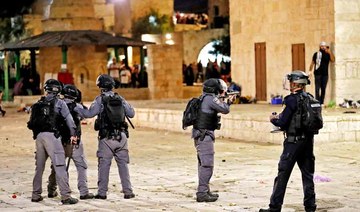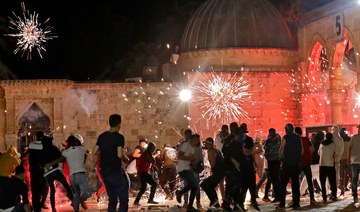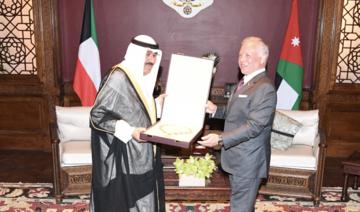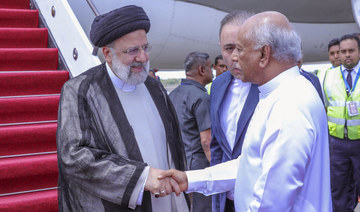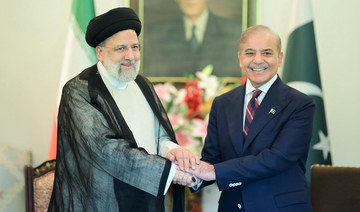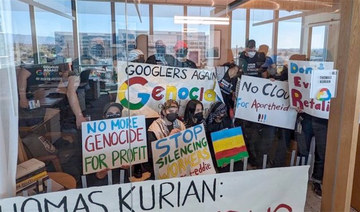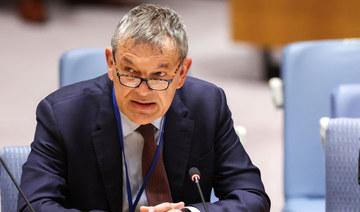JERUSALEM: Dressed in sparkly new clothes and clutching balloons, excited children Thursday revelled in the Muslim Eid Al-Fitr celebrations in Jerusalem’s Old City.
But days of violence lay heavy on their parents’ hearts.
As the first rays of sun began to break over the Al-Aqsa mosque compound, the third holiest site of Islam, crowds of Palestinians gathered for the first prayers to mark the end of the holy fasting month of Ramadan.
The three-day festival is traditionally celebrated with mosque prayers, family feasts and shopping for new clothes, gifts and sweets.
Stalls stacked high with colorful plastic toys, or tasty sesame-dipped snacks that are a Jerusalem specialty, tempted the crowds snaking along the Old City’s narrow stone streets.
At the centuries-old Damascus Gate, scene of violent clashes between Israeli Arabs and police at the start of Ramadan, two huge bundles of helium-filled balloons fluttered in the spring breeze. Mickey Mouse and Spiderman could be spotted bobbing among them.
Just three days ago, Israeli police deployed so-called skunk water there — a putrid mixture of sewage water — to disperse the crowds after a weekend of unrest in different parts of Israeli-occupied east Jerusalem.
Hundreds of Palestinians were injured as well as dozens of Israeli police in the clashes which also erupted on the Temple Mount, the most sacred site in Judaism, on which the Al-Aqsa mosque and the golden Dome of the Rock shrine also stand.
The convulsion of violence has since spread, engulfing the Gaza Strip run by the Islamic militant Hamas movement, the Palestinian territory of the West Bank and Israeli cities which have seen unprecedented mob clashes between Jewish and Arab residents.
On Thursday the boom of rocket fire could be periodically heard in Jerusalem, where calm has mainly returned to the streets. But many believe it may just be the calm before a further storm.
“Do you see any problems, there, right now? No,” said Jabbar, who is in his 60s, pointing at crowds of Palestinians being carefully watched by heavily-armed Israeli police at Damascus gate.
“But it could flare up again at any minute,” he warned grimly.
“Everything will return to normal if God so wishes it,” said Fefka, who lives in the east Jerusalem quarter of Issawiya.
“The violence has to stop, but everything is only done for the settlers here,” she added angrily.
“Jerusalem is also ours,” she insisted, denouncing Israeli settlers who have moved into the east of the city since it was seized in the 1967 war.
According to the United Nations, east Jerusalem has been illegally occupied and annexed by Israel since then.
Hiba, 26, and Soujoud, 21, have been visiting the Al-Aqsa compound since Friday, the day the troubles erupted, triggered by the threat of evicting Palestinian families from their east Jerusalem homes to allow settlers to move in.
“Morning and evening, we stayed at Al-Aqsa,” said Soujoud, a secretarial student. “We don’t want any problems (with the police), but the mosque is ours and we have to defend it,” she added.
On the site, which overlooks the sprawling Old City below, children were entertained by a clown, while adults brandished Hamas flags and rolled out banners praising the Islamist movement.
“Jerusalem is a red line,” read one of the banners.
On Al-Wad Street which crosses the Old City, some passers-by were wearing shirts decorated with Palestinian flags, others had painted them on the cheeks.
Many were wearing the black-and-white chequered keffiyah scarf which has become a symbol of the Palestinian cause.
“We feel very sad for the Eid today, because of the situation and the violence,” said Hiba.
“We can’t be happy when we see what is happening in Gaza and elsewhere.”
Holy city of Jerusalem marks sad end to Ramadan
https://arab.news/68m9a
Holy city of Jerusalem marks sad end to Ramadan
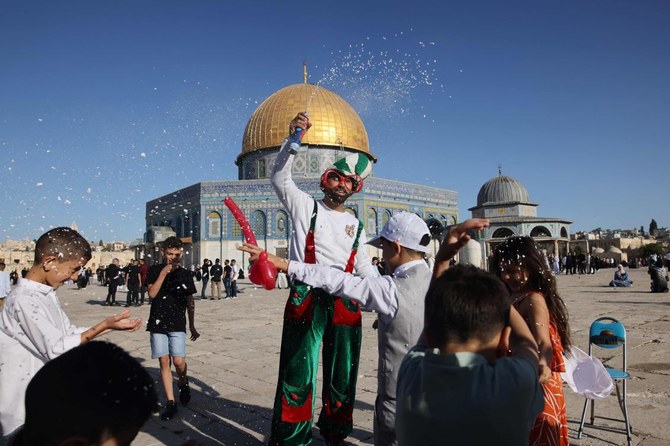
- Violence lay heavy on hearts of parents of children dressed in new clothes and clutching balloons reveling to celebrate Eid al-Fitr in Jerusalem’s Old City
- As sun began to break over al-Aqsa mosque crowds of Palestinians gathered for the first prayers to mark Ramadan’s end
Iran cuts Syria presence after strikes blamed on Israel: monitor
Iran has provided military support to Syrian government forces through more than a decade of civil war but a series of strikes targeting its commanders in recent months has prompted a reshaping of its presence, the sources said.
“Iran withdrew its forces from southern Syria,” including both Quneitra and Daraa provinces, which abut the Israeli-annexed Golan Heights, the source close to Hezbollah said.
But it still maintains a presence in other parts of the country, the source added.
Recent months have seen a series of strikes on Iranian targets in Syria, widely blamed on Israel, culminating in an April 1 strike that levelled the Iranian consulate in Damascus and killed seven Revolutionary Guards, two of them generals.
That strike prompted Iran to launch a first-ever direct missile and drone attack against Israel on April 13-14 that sent regional tensions spiralling.
But Iran had already begun drawing down its forces after a January 20 strike that killed five Revolutionary Guards in Damascus, including their Syria intelligence chief and his deputy, the source close to Hezbollah said.
Britain-based war monitor, the Syrian Observatory for Human Rights, said Iranian forces had withdrawn from Damascus and southern Syria.
Iran-backed Lebanese and Iraqi fighters had taken their place, Observatory chief Rami Abdel Rahman said.
Iran has said repeatedly that it has no combat troops in Syria, only officers to provide military advice and training.
But the Observatory says as many as 3,000 Iranian military personnel are present in Syria, supported by tens of thousands of Iran-trained fighters from countries including Lebanon, Iraq and Afghanistan.
Abdel Rahman said that many of Iran’s advisers had left Syria over the past six months, although some remained in Aleppo province in the north and in Deir Ezzor province in the east.
Jordan King issues decree to hold parliamentary elections - state TV
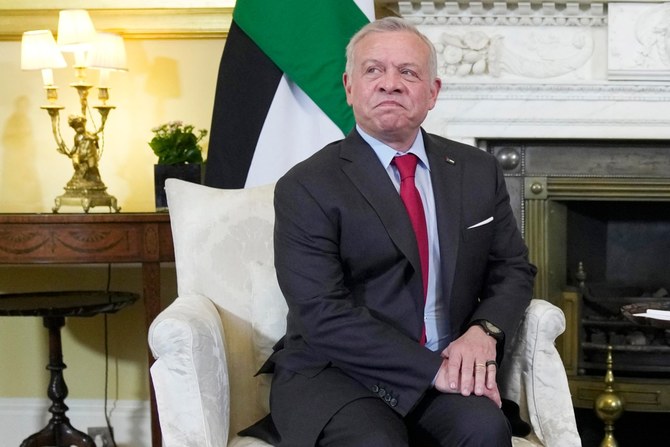
DUBAI: Jordan’s King Abdullah issued a royal decree on Wednesday announcing that a parliamentary election will be held, state TV said.
Under the constitution, the multi-party election is usually held within four months of the end of a four-year term of parliament. The country’s last election, with over 4.6 million eligible voters, was held in November 2020.
An independent election commission decides the exact date.
Iran, Pakistan urge UN Security Council to take action against Israel
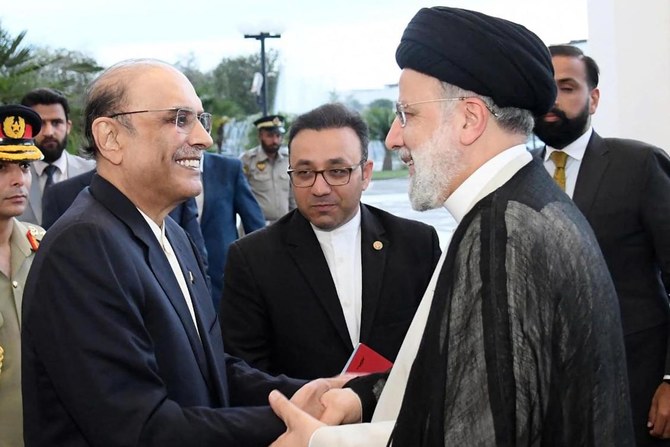
- The joint statement followed a three-day visit to the country by Iranian President Ebrahim Raisi
- Muslim neighbors Iran and Pakistan are seeking to mend ties after unprecedented tit-for-tat military strikes this year
ISLAMABAD: Iran and Pakistan called on the United Nations Security Council in a joint statement issued on Wednesday to take action against Israel, saying it had “illegally” targeted neighboring countries and foreign diplomatic facilities.
The joint statement, released by Pakistan’s foreign ministry, followed a three-day visit to the country by Iranian President Ebrahim Raisi at a time of heightened tensions in the Middle East.
Explosions were heard last Friday over the Iranian city of Isfahan in what sources said was an Israeli attack. However, Tehran played down the incident and said it had no plans for retaliation.
“Recognizing that the irresponsible act of the Israeli regime forces was a major escalation in an already volatile region, both sides called on the UN Security Council to prevent the Israeli regime from its adventurism in the region and its illegal acts attacking its neighbors...,” Iran and Pakistan said in their joint statement.
Muslim neighbors Iran and Pakistan are seeking to mend ties after unprecedented tit-for-tat military strikes this year.
Raisi, who wrapped up his visit and flew on to Sri Lanka on Wednesday, vowed to boost trade between Iran and Pakistan to $10 billion a year.
During his visit to Pakistan, Raisi was quoted by Iran’s official IRNA news agency as saying any further Israeli attack on Iranian territory
could radically change the dynamics and result in there being nothing left of the “Zionist regime.”
On April 13, Tehran launched a barrage of missiles and drones at Israel in what it said was retaliation for Israel’s suspected deadly strike on the Iranian embassy compound in Damascus on April 1, but almost all were shot down.
Pakistan has previously called for de-escalation by “all parties.”
Iran and Pakistan vowed during Raisi’s visit to boost trade and energy cooperation, including on a major gas pipeline deal that has faced delays due to geopolitical issues and international sanctions.
Lebanon’s Hezbollah says fired ‘dozens’ of rockets at Israel
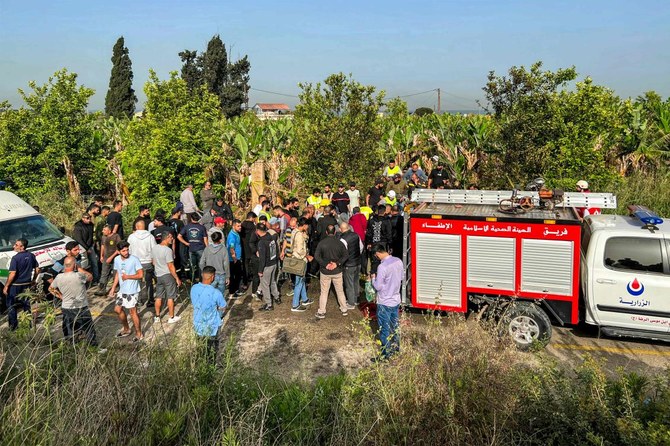
- Hezbollah has exchanged near-daily fire with the Israeli army
- Israel says 11 soldiers and eight civilians have been killed on its side of the border
Beirut: Lebanon’s Iran-backed Hezbollah movement said it fired a fresh barrage of rockets across the border on Wednesday after a strike blamed on Israel killed two civilians.
The group had already fired rockets at northern Israel late on Tuesday “in response” to the civilian deaths.
Hezbollah has exchanged near-daily fire with the Israeli army since its ally Hamas carried out an unprecedented attack on Israel on October 7, triggering war in Gaza.
It has stepped up its rocket fire on Israeli military bases in recent days.
Hezbollah fighters fired “dozens of Katyusha rockets” at a border village in northern Israel “as part of the response to the Israeli enemy’s attacks on... civilian homes,” the group said in a statement.
On Tuesday, rescue teams said an Israeli strike on a house in the southern village of Hanin killed a woman in her fifties and a girl from the same family.
Since October 7, at least 380 people have been killed in Lebanon, mostly Hezbollah fighters but also 72 civilians, according to an AFP tally.
Israel says 11 soldiers and eight civilians have been killed on its side of the border.
Germany to resume cooperation with Palestinian UNRWA agency
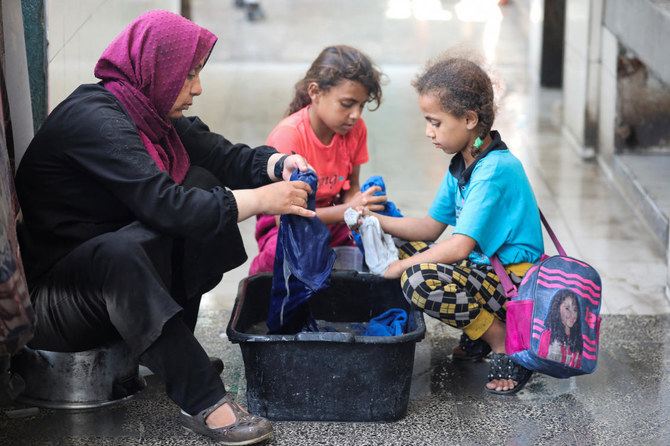
BERLIN: The German government plans to resume cooperation with the UN agency for Palestinians (UNRWA) in Gaza, the foreign and development ministries said in a joint statement on Wednesday.
The decision follows an investigation by the former French foreign minister Catherine Colonna into whether some UNRWA employees were involved in the Oct. 7 attack by Hamas.
The Colonna-led review of the agency’s neutrality on Monday concluded Israel had yet to back up its accusations that hundreds of UNRWA staff were operatives in Gaza terrorist groups.
The German ministries urged UNRWA to swiftly implement the report’s recommendations, including strengthening its internal audit function and improving external oversight of project management.
“In support of these reforms, the German government will soon continue its cooperation with UNRWA in Gaza, as Australia, Canada, Sweden and Japan, among others, have already done,” said the ministries in the statement.






